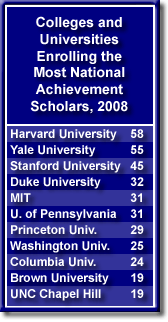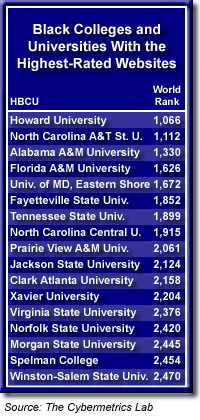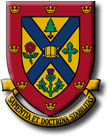Are Black Student Athletes Getting a Free Pass on Academics?
 Over the years there have been persisting charges that student athletes, particularly black male football and basketball players, are given an easy academic ride so that they will remain eligible to participate in intercollegiate sports. One way this has been accomplished has been to cluster athletes in major subjects that have a reputation for a low level of academic difficulty. Often there are faculty in these departments who are fans of the football or basketball programs and want to see athletes succeed and stay in college. Over the years there have been persisting charges that student athletes, particularly black male football and basketball players, are given an easy academic ride so that they will remain eligible to participate in intercollegiate sports. One way this has been accomplished has been to cluster athletes in major subjects that have a reputation for a low level of academic difficulty. Often there are faculty in these departments who are fans of the football or basketball programs and want to see athletes succeed and stay in college.
A new study by scholars at Nova Southeastern University, published in the Journal of Issues in Intercollegiate Athletics, finds that there are indications that many student athletes are getting a free pass. The authors of this study collected data on the majors of upperclass athletes from the media guides of universities in the Atlantic Coast Conference. Many of the schools in the conference, such as the University of Virginia, the University of North Carolina at Chapel Hill, and Duke University, are among the nation’s highest-ranked academic institutions.
The study found that black athletes are far more likely to be clustered in particular majors than white athletes at these institutions. At six of the schools in the conference, 75 percent or more of the black athletes were clustered into just two academic departments.
The authors cite an earlier study which showed that 26 percent of the football players at Auburn University majored in sociology compared to 0.3 percent of the entire student body.
The authors dismiss the argument that athletes tend to cluster in departments because of flexibility in scheduling or in departments that have a wide variety of class times. They point out that the large racial differences in course of study clustering at particular institutions show that scheduling is not the major reason why athletes gravitate toward a particular academic department.
The authors call for greater oversight of academic programs by the National Collegiate Athletic Association, especially in cases where there is a large cluster of student athletes in a particular department.
Vanderbilt University’s MOSAIC Weekend Looks to Lock Up Accepted Black Students’ Commitment to Enroll Before Peer Institutions Get a Chance to Act
Each April many high-ranking colleges and universities encourage campus visits by black students who have been admitted but have not decided where they will enroll. But Vanderbilt has a unique program that may give it a leg up in beating its peer institutions in attracting the brightest young black students.
Each February, Vanderbilt sends out packets to 200 minority students who have applied during the regular admissions cycle. These 200 students are informed that they will be accepted into the university when official notices go out around April 1. But the students are invited to attend MOSAIC Weekend at Vanderbilt in March, weeks before they hear if they have been accepted at the other colleges and universities to which they applied.

In notifying these students early that they will be accepted and bringing them to campus, Vanderbilt seeks to persuade minority students to enroll at Vanderbilt before they even hear whether they have been accepted for admission at other institutions.
Students invited to the four-day program get to stay with current students in their dormitories, attend classes, and participate in cultural, social, and athletic events.
The MOSAIC Weekend appears to be a very successful event. Black enrollments to Vanderbilt have increased dramatically in recent years.
Few National Achievement Scholars Enroll at Historically Black Colleges and Universities
 In 1964 the National Merit Scholarship Corporation founded the National Achievement Scholarship Program for Outstanding Negro Students. The program, which is explicitly restricted to blacks, awarded 815 scholarships in 2008 valued at $2.6 million. In 1964 the National Merit Scholarship Corporation founded the National Achievement Scholarship Program for Outstanding Negro Students. The program, which is explicitly restricted to blacks, awarded 815 scholarships in 2008 valued at $2.6 million.
In recent years National Achievement Scholars flocked to historically black colleges and universities. For example, in 1996 Florida A&M University, the historically black educational institution in Tallahassee, enrolled 73 National Achievement Scholars, more than any other college or university in the nation. In the fall of 2006 only one of the 800 National Achievement Scholars enrolled at Florida A&M. However, there has been a significant rebound from FAMU’s historic lows. There are 11 black Achievement Scholars in this year’s freshman class at Florida A&M.
 The drop in Achievement Scholars has also been apparent at other historically black educational institutions. In 2002 there were 54 Achievement Scholars at Howard University. This year there are only 14. The drop in Achievement Scholars has also been apparent at other historically black educational institutions. In 2002 there were 54 Achievement Scholars at Howard University. This year there are only 14.
In 2008 Harvard University enrolled 58 National Achievement Scholars, the most of any educational institution in the United States. Yale, Stanford, Duke, MIT, and the University of Pennsylvania all enrolled more than 30 National Achievement Scholars.
Clearly the nation’s wealthy, predominantly white educational institutions are making a concerted effort to attract National Achievement Scholars. It appears that the nation’s historically black institutions, with far fewer financial assets, are having difficulty competing for these students.
Three Scholars at Work on an Encyclopedia of Black History in Kentucky
Entries are currently being collected for the Kentucky African-American Encyclopedia, which the University Press of Kentucky anticipates will be published by 2011. The encyclopedia will provide a comprehensive volume of research on the black experience in the Commonwealth. It will include entries on individuals, events, places, organizations, movements, and institutions that have shaped the state’s history since its origins. It will also include topical essays on slavery, education, women, religion, sports, business, and civil rights.
The three editors of the encyclopedia are:
 • John A. Hardin, an associate professor of history at Western Kentucky University. He is a graduate of Bellarmine University in Louisville. Dr. Hardin holds a master’s degree from Fisk University and a Ph.D. in history from the University of Michigan. • John A. Hardin, an associate professor of history at Western Kentucky University. He is a graduate of Bellarmine University in Louisville. Dr. Hardin holds a master’s degree from Fisk University and a Ph.D. in history from the University of Michigan.
 • Karen Cotton McDaniel is a visiting scholar at Eastern Kentucky University where she is coordinating a community of 10 scholars, each of whom is committed to submitting at least three entries for the encyclopedia each academic semester. She is professor emerita at Kentucky State University where she was director of libraries from 1989 to 2005. A graduate of Berea College, she holds a master’s degree in library science from the University of Kentucky. She is currently completing her doctoral dissertation in history on the topic of African-American women’s clubs in Kentucky. • Karen Cotton McDaniel is a visiting scholar at Eastern Kentucky University where she is coordinating a community of 10 scholars, each of whom is committed to submitting at least three entries for the encyclopedia each academic semester. She is professor emerita at Kentucky State University where she was director of libraries from 1989 to 2005. A graduate of Berea College, she holds a master’s degree in library science from the University of Kentucky. She is currently completing her doctoral dissertation in history on the topic of African-American women’s clubs in Kentucky.
 • Gerald L. Smith is an associate professor of history at the University of Kentucky and pastor of the Farristown Baptist Church in Berea. He holds bachelor’s, master’s, and doctoral degrees in history from the University of Kentucky. • Gerald L. Smith is an associate professor of history at the University of Kentucky and pastor of the Farristown Baptist Church in Berea. He holds bachelor’s, master’s, and doctoral degrees in history from the University of Kentucky.
For more information on this project, click here.
  |
30* Number of college athletic conferences in the United States.
0 Number of commissioners of these athletic conferences who are black.
* Excluding those conferences made up of teams from historically black colleges and universities.
source: Institute for Diversity and Ethics in Sport, University of Central Florida
|
In a Surprise, Stanley Battles Resigns as Chancellor at North Carolina A&T State University After Only Two Years on the Job
 In a move that caught many observers by surprise, Stanley Battle, chancellor of North Carolina A&T University in Greensboro, announced that he would be leaving his post at the end of the academic year. Battle has held the chancellor’s post since July 1, 2007. In a move that caught many observers by surprise, Stanley Battle, chancellor of North Carolina A&T University in Greensboro, announced that he would be leaving his post at the end of the academic year. Battle has held the chancellor’s post since July 1, 2007.
The official announcement stated that Battle was leaving for family and personal reasons. Battle’s mother had died on Christmas Day.
But there were also reports that Battle’s managerial style and plans for the university were at odds with faculty, students, alumni, and the board of trustees. The conflict apparently was due to Battle’s plan to raise admissions standards which many felt ran counter to the institution’s historical goal of providing higher education to a larger group of African Americans who had few options.
Battle had served as president of Coppin State University in Baltimore before taking the job as chancellor at NCAT.
Honors and Awards
 • Diane Nash, one of the founding members of the Student Non-Violent Coordinating Committee and a leader in the lunch counter sit-in movement in Nashville, Tennessee, received the Human Rights Medal from North Carolina A&T State University, the historically black educational institution in Greensboro. • Diane Nash, one of the founding members of the Student Non-Violent Coordinating Committee and a leader in the lunch counter sit-in movement in Nashville, Tennessee, received the Human Rights Medal from North Carolina A&T State University, the historically black educational institution in Greensboro.
 • This coming weekend, Norman C. Francis, president of Xavier University in New Orleans, will receive the St. Katharine Drexel National Justice Award from the Sisters of the Blessed Sacrament in Bensalem, Pennsylvania. • This coming weekend, Norman C. Francis, president of Xavier University in New Orleans, will receive the St. Katharine Drexel National Justice Award from the Sisters of the Blessed Sacrament in Bensalem, Pennsylvania.
 • Deryl Bailey, an associate professor of counseling in the College of Education at the University of Georgia, received the 2009 Don Dinkmeyer Social Interest Award from the American Counseling Association for his work mentoring young black men. • Deryl Bailey, an associate professor of counseling in the College of Education at the University of Georgia, received the 2009 Don Dinkmeyer Social Interest Award from the American Counseling Association for his work mentoring young black men.
Dr. Bailey has been on the University of Georgia faculty since 1999. He holds a doctorate in counselor education from the University of Virginia.
 • Jacqueline J. Hill, chair of the undergraduate nursing program at Southern University in Baton Rouge, received the 2009 Nightingale Award for District Officer of the Year from the Louisiana State Nurses Association. • Jacqueline J. Hill, chair of the undergraduate nursing program at Southern University in Baton Rouge, received the 2009 Nightingale Award for District Officer of the Year from the Louisiana State Nurses Association.
|
Only One Black Among the 65 New Members of the National Academy of Engineering
 In common with many honorary societies in the United States, the National Academy of Engineering (NAE) has almost no black members. The NAE states that it has no data on the race of its 2,246 members. Yet from information provided by various members, JBHE has determined that there are about 15 blacks among the society’s fellows. In common with many honorary societies in the United States, the National Academy of Engineering (NAE) has almost no black members. The NAE states that it has no data on the race of its 2,246 members. Yet from information provided by various members, JBHE has determined that there are about 15 blacks among the society’s fellows.
This year the NAE elected 65 new members to the society. Once again the academy did not disclose the race of its new members. But a detailed search of the membership list by JBHE found that only one of the new members is black.
 The new African-American member of the National Academy of Engineering is Percy A. Pierre. Today, Pierre is vice president and professor emeritus of electrical and computer engineering at Michigan State University. A native of St. James Parish, Louisiana, Pierre holds bachelor’s and master’s degrees from the University of Notre Dame. In 1967 he earned a Ph.D. in electrical engineering from Johns Hopkins University. He is generally recognized as the first African American to earn a doctorate in electrical engineering. The new African-American member of the National Academy of Engineering is Percy A. Pierre. Today, Pierre is vice president and professor emeritus of electrical and computer engineering at Michigan State University. A native of St. James Parish, Louisiana, Pierre holds bachelor’s and master’s degrees from the University of Notre Dame. In 1967 he earned a Ph.D. in electrical engineering from Johns Hopkins University. He is generally recognized as the first African American to earn a doctorate in electrical engineering.
After serving as a White House fellow during the Nixon administration, in 1971 Pierre joined the faculty of Howard University, serving as dean of the College of Engineering. In the Carter administration, Pierre served as assistant secretary of the Army for research, development, and regulation.
Later, Pierre served six years as president of Prairie View A&M University, a historically black educational institution in Texas. He joined the faculty at Michigan State University in 1990. Dr. Pierre is now 70 years old.
  |
 “We need a large increase in the number of physics majors. And we can’t afford to have almost all of them be white men.” “We need a large increase in the number of physics majors. And we can’t afford to have almost all of them be white men.”
— Arthur Bienenstock, professor of physics at Stanford University and president of the American Physical Society
|
There Are No Black Colleges or Universities Among the 1,000 Highest-Rated University Websites
The Cybermetrics Lab, a research group based in Spain, has rated nearly 15,000 university websites throughout the world. The Cybermetrics Lab publishes a list of the 4,000 top university websites. The websites are ranked on a number of different criteria including the number of web pages at the site, the number of links to the university’s website from other Internet sites, and the scholarly content available online through the university’s website.
 Of the 4,000 highest-rated university websites in the world, 35 belong to black colleges and universities. Therefore, given that nearly 15,000 college and university websites were examined by the Cybermetrics Lab, the fact that 35 black colleges rank in the top 27 percent of all university websites is good news. The bad news is that none of the black colleges or universities rank among the top 1,000 websites worldwide. Of the 4,000 highest-rated university websites in the world, 35 belong to black colleges and universities. Therefore, given that nearly 15,000 college and university websites were examined by the Cybermetrics Lab, the fact that 35 black colleges rank in the top 27 percent of all university websites is good news. The bad news is that none of the black colleges or universities rank among the top 1,000 websites worldwide.
The highest-rated website at a historically black college or university belongs to Howard University. Yet Howard is rated in 1,066th position in the world rankings. Howard is ranked just ahead of the websites for the Nanhua University of Taiwan and the University of Bordeaux in France.

Effort Under Way to Improve Black Male Graduation Rates at the University of Maryland
 At the University of Maryland’s flagship campus at College Park, 57 percent of all entering black male students go on to graduate within six years. For black women the graduation rate of 72 percent is 15 percentage points higher. White males have a graduation rate of 77 percent, a full 20 percentage points higher than the rate for black males. At the University of Maryland’s flagship campus at College Park, 57 percent of all entering black male students go on to graduate within six years. For black women the graduation rate of 72 percent is 15 percentage points higher. White males have a graduation rate of 77 percent, a full 20 percentage points higher than the rate for black males.
In an effort to boost the graduation rate of African-American men, the university has established the Black Male Initiative. Its goal is to establish a structure where black men can receive mentoring, guidance, and academic support. And black men can take advantage of a peer network and study groups that they can employ to help them succeed.
Black Studies Program at the University of Iowa Looks to Regain Departmental Status
The African-American studies program at the University of Iowa was created 40 years ago in 1969. In 2004 the program lost its departmental status when only three faculty members remained, two short of the university’s requirement for departmental status. At the current time there are only 13 students majoring in African-American studies on a campus with an undergraduate student body of 21,000. About 2.4 percent of all undergraduates on campus are black.
 Richard Turner, an associate professor of religious studies at the University of Iowa, is coordinator of the black studies program. He is following a plan to restore the program to departmental status. First, he is working on a new curriculum which will include an introductory course that will be open to a large number of students. Second, he is looking to boost the number of black studies faculty and staff. Finally, the goal is to establish a research center in a specific area of black studies that will attract both students and scholars to the university. Richard Turner, an associate professor of religious studies at the University of Iowa, is coordinator of the black studies program. He is following a plan to restore the program to departmental status. First, he is working on a new curriculum which will include an introductory course that will be open to a large number of students. Second, he is looking to boost the number of black studies faculty and staff. Finally, the goal is to establish a research center in a specific area of black studies that will attract both students and scholars to the university.
Update: Queen’s University Names Building After Its First Black Graduate
 Last month JBHE reported that the board of trustees of Queen’s University in Kingston, Ontario, had declined a motion offered by a student group to name a building on campus after Robert Sutherland, the university’s first black graduate. Sutherland graduated from the university in 1852 and later bequeathed his entire estate to the university. The money from the Sutherland estate enabled Queen’s University to stay open during some troubled economic times. Last month JBHE reported that the board of trustees of Queen’s University in Kingston, Ontario, had declined a motion offered by a student group to name a building on campus after Robert Sutherland, the university’s first black graduate. Sutherland graduated from the university in 1852 and later bequeathed his entire estate to the university. The money from the Sutherland estate enabled Queen’s University to stay open during some troubled economic times.
Now the board of trustees has reconsidered the students' request and voted to name the university’s policy studies building in honor of Sutherland.
In Memoriam
Bennie D. Mayberry Sr. (1911-2009)
 Bennie D. Mayberry, who spent 40 years on the faculty or in the administration at Tuskegee University, died last month in Alabama. He was 97 years old. Bennie D. Mayberry, who spent 40 years on the faculty or in the administration at Tuskegee University, died last month in Alabama. He was 97 years old.
At Tuskegee, Mayberry served as dean, professor of agriculture, environmental and natural sciences, and as director of the George Washington Carver Research Foundation.
Dr. Mayberry was a graduate of Tuskegee University. He held a master’s degree and a Ph.D. from Michigan State University.
Appointments
 • Jermaine Holmes was named director of student athlete academic support services at Virginia Tech. He was assistant director of student athlete support services at Ohio State University. • Jermaine Holmes was named director of student athlete academic support services at Virginia Tech. He was assistant director of student athlete support services at Ohio State University.
Holmes holds bachelor’s and master’s degrees from Virginia Tech.
 • LeKita V. Scott was named director of foundation relations at Syracuse University. She was the director of development for Claflin University in Orangeburg, South Carolina. • LeKita V. Scott was named director of foundation relations at Syracuse University. She was the director of development for Claflin University in Orangeburg, South Carolina.
• Phyllis Y. Watson was promoted to director of continuing education at Florida A&M University in Tallahassee. She has been an administrator at the university for the past decade.
Watson is a graduate of Florida A&M University and holds an MBA from Nova Southeastern University. She is currently a doctoral candidate in organizational leadership.
 • Diedrick Graham was promoted to the position of ombuds officer at Princeton University. He was the associate ombuds officer. He will be in charge of dispute resolution through mediation, counseling, or referrals to appropriate university services. • Diedrick Graham was promoted to the position of ombuds officer at Princeton University. He was the associate ombuds officer. He will be in charge of dispute resolution through mediation, counseling, or referrals to appropriate university services.
Graham is a graduate of the University of Alabama. He holds master’s degrees from the University of Oklahoma and the Interdenominational Theological Center in Atlanta.
 • Karla Garrett Harshaw, vice president of community development for Cox Ohio Publishing, will spend the remainder of the calendar year as “executive-on-loan” to Wilberforce University. Harshaw, a member of the university’s board of directors, will work on publicity and fundraising. • Karla Garrett Harshaw, vice president of community development for Cox Ohio Publishing, will spend the remainder of the calendar year as “executive-on-loan” to Wilberforce University. Harshaw, a member of the university’s board of directors, will work on publicity and fundraising.
Grants
• Claflin University in Orangeburg, South Carolina, received a $250,000 grant from the Arthur Vining Davis Foundation. The money will be used to construct a new chapel on campus.
• Oklahoma State University received a three-year, $499,372 grant from the National Science Foundation for a program to increase the number of women and minority students in the fields of agriculture, science, technology, engineering, and mathematics.
• Delaware State University, the historically black educational institution in Dover, received a $1 million grant from the National Science Foundation to enhance its doctoral program in neuroscience.
• The Amistad Research Center at Tulane University received a $250,000 grant from the Andrew W. Mellon Foundation to process and catalog nine collections of papers from individuals who were major participants in the civil rights struggle.
|
 .
.